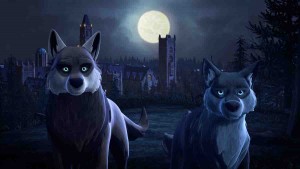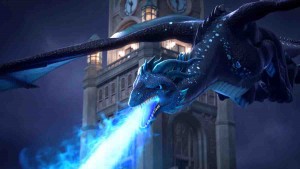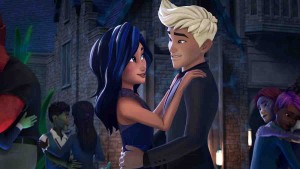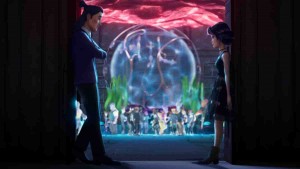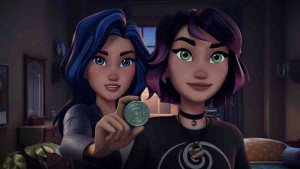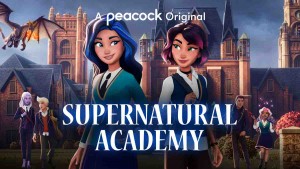SUPERNATURAL ACADEMY, the animated series based on Jaymin Eve’s novels and produced by 41 Entertainment, is now streaming its entire first season on Peacock.
In Part 3 of our exclusive interview with show runner Gillian Horvath, she talks about real-world analogies, what makes SUPERNATURAL ACADEMY distinctive in its take on a classic premise, and possibilities for Season 2.
ASSIGNMENT X: How did you decide on doing sixteen half-hour episodes?
GILLIAN HORVATH: It wound up being sixteen half-hours, but was originally conceived as eight hourlong episodes to cover the storyline. We pitched it to just a few places, and Peacock was on board pretty fast. They were our first pitch, and they were our buyer, and we had a great relationship working with Peacock. Christopher Updike at Peacock is a really great executive to work with. All of that was over the span of the end of 2019-beginning of 2020. We did the writing in the summer of 2020, because animation, of course, has a long production tail, to go from writing to voice records to the actual animation.
The episodes did all drop at once. The first one or two are available to non-subscribers of Peacock. You can just go to the website or download the app. To watch the rest, you do need to sign up for a membership. But honestly, I’ve been telling all of my friends, “If you sign up for a Peacock membership to watch SUPERNATURAL ACADEMY, there are some other cool shows on Peacock, so why not sign up for a month and check out all the Peacock shows at once?”
I particularly love GIRLS5EVA, the rock ‘n’ roll reunion, and WOLF LIKE ME, which is a very cool Australian series about a wolf shifter. So, I really hope that the Peacock algorithm is recommending these two shows – if you watch WOLF LIKE ME, I hope Peacock offers you SUPERNATURAL ACADEMY next, and vice-versa. I think they’re appealing to pretty much the same demographic, although WOLF LIKE ME is a bit more violent, so maybe for the older end of the age group.
SUPERNATURAL ACADEMY is [for ages] fourteen-plus officially, but I know plenty of people who are watching it with their ten-, eleven-, twelve-year-olds. It depends on the kid, but other than the swear words, it’s not got a heavy amount of gore or violence or some of those other things that might be distressing to little kids, I’m hearing that families are watching it together, which is what we really hope for.
In many households, this will not be the first time the kids have heard someone say, “a**hole” [laughs]. But that’s up to everyone to decide for themselves, so that’s why it’s rated as it is, because we want people to be aware it’s not for little kids, it’s not for the preschool set. But I’ve heard of some eight- and nine-year-olds watching it, and I certainly think anyone eleven and up is ready for this show. I think kids are very sophisticated, honestly. I think people sometimes underestimate what twelve- and thirteen-year-olds are aware of about the world around them.
AX: The supernatural academy is in Stratford. Where is Stratford meant to be geographically?
HORVATH: It is a fictional Stratford, Connecticut. The author, Jaymin, is Australian, and she’s not made a trip to Connecticut, that I know of, so she fictionalized a version of this East Coast old-school U.S. And one of our executives at 41 Entertainment actually grew up in Stratford. So, that was just a lovely coincidence – she kept her eye out for architectural accuracy to the region.
But the Stratford enclave where the supernaturals live is not the human town of Stratford, Connecticut, it’s just near it. They live in their town, they have their boundary dome to hide it from any casual hikers who might spot it. The academy is not the only thing in the town of Stratford. Supernaturals live there.
The supernatural town has its own restaurants and stores. [The residents] wouldn’t casually go into [the human] town for pizza. As Jessa points out, not everyone even can. Only some of them have the privilege of looking human enough to go into town, so it’s not thing that’s lightly done, or often done. It’s not that close, either. When Mischa and her mother are running for the boundary, it’s not next to the train station by any means.
They don’t leave the boundary at the beginning [of SUPERNATURAL ACADEMY]. Until the Enforcers lock the boundary partway through the story, it’s not forbidden to leave, but it’s not advised, and it is definitely forbidden to let humans figure out that supernaturals exist.
We were so happy that we found a way for the storyline to come back to New York, and not only because it meant we could get better sets built for the New York scenes in the first episode, because if we’re going to be able to use them in [multiple episodes], then you can get more resources directed that way, and get the whole street, and the whole bodega, and the apartment, and the rooftop, and have all those elements.
But the other reason is because I was really glad to bring Hallie back into the show. I love her as a character so much. She really does represent that eagerness to find magic in the world, and I would be looking for ways in the future to bring her into stories again, to find ways for her to participate. Get her a ticket to Stratford, I’d want to see how she’d react. I think there’s a potentially cool story there, and she has that great friendship with Jae. So, I don’t think we’ve seen the last of her as our story continues.
AX: There’s a sequence where you have a crowd believing self-serving lies and marching on the school. Was that meant to be a January 6 reference, or was that coincidental?
HORVATH: The riot in the scripts predates the January 6 insurrection. They were written in the summer of 2020. Because angry mobs with pitchforks being wound up into a frenzy by a charismatic leader like Kristov is not new. I could make analogies to various countries in various decades. That’s part of I want to say about the human condition, but of course supernaturals are people, but not humans. So, it’s a condition of sentient beings to be susceptible to charismatic leaders, and to be susceptible to fear-mongering.
The clearer parallels have to do with the distrust of refugees, the xenophobia, the fact that the Dragon King committed violent insurrection, and therefore all dragon creatures were suspect. It’s pure prejudice, right? That’s purely, one dragon did a terrible, violent thing. In the beginning, [the rest of the magical community] hunted all the dragons almost to extinction, and since then, they have justified to themselves putting any dragon-marked person into preemptive prison because they might do something wrong simply based on an accident of their birth. Something about their physical appearance makes them assumed to be dangerous.
And people who are otherwise good and honorable, like Jonathon and the rest of the Council, have fallen into the societal trap of thinking that it’s justified for the safety of society, you have to take a whole category of people who’ve done nothing wrong except look a certain way – they have these dragon marks – and it’s okay to lock them up, because we’re all safer for it, and we’re going to tell ourselves that we’re taking good care of them, as opposed to punishing them, and torturing them. They throw the dragon-marked in jail, and the dragon-marked become an angry mob who want to turn on society, because they’ve been mistreated by it. And when you treat them well, they become heroes.
AX: Were there things that you felt you had to veer away from, because there is another fictional magical school that’s kind of famous?
HORVATH: But there are a lot of magical schools. I don’t think there’s only one magical school in all of literature. I was an adult by the time the HARRY POTTER books came out. They didn’t strike me as groundbreaking, which is not a denigration. You can tell stories that have been told before in new ways. There are lots of stories of pulling the sword from the stone that are different. Robin Hood gets told again and again, in one form or another, and I think the story of the kids finding out that they have some kind of magical background that they didn’t know about, and that there is a school for wizards. Diane Duane has a series of a school for wizards books from the ‘80s.
I absolutely love THE MAGICIANS, the books and the TV series. But the books are a pastiche. HARRY POTTER is just the most famous, by leaps and bounds, of an entire genre of supernatural high school, or superhero high school types of stories. I think there are plenty. So, I don’t think that we needed to specifically steer into or away from the specifics of Hogwarts. I was an adult when HARRY POTTER came out. I’m not a particularly an aficionado. You can’t live in the world and not know the basics of it, but I don’t know the page-by-page specifics of it, so I didn’t have to work to not tell a similar story, because I don’t actually know that story that intimately.
So, we told our story rising from Jaymin’s book, and rising from who these characters are. Because that’s how it starts. We start with these characters, who she created, and who we fleshed out in a certain way for our use to make them sixteen at the build-up. The dichotomy between them was a big thing for me. In the original books, Jessa is the main character, and Mischa is the secondary character. For purposes of my own interest, and purposes of the series, we wanted them to be co-equal characters, from two different worlds, and you start from that, and your story goes from there.
If we did hit upon story points or moments or props that are similar to another project, I think there may have been a couple of times that happened in the creative process, and someone on the team said, “You know what, that seems similar to another gag in another show, so let’s find a different gag.” But in terms of the overall story arc, I feel like that one is driven by – our two sister characters drive that story forward, and not thinking about other stories or other projects.
I have noticed that there are some other things called SUPERNATURAL ACADEMY in the world, some games. If you search it on Twitter, you’ll see things other than our show, so the title can cause a little bit of confusion that way, but at the same time, it describes our show exactly, and the books have been around for longer than our show.
You could say, “Oh, there are already things out there that take place in magical academies. There are decades of things that take place in magical academies.” But if you look at things from thirty, or twenty, or fifteen years ago, some of them have material in them that make them uncomfortable to watch, especially for people of color, or people who are of different places on the gender spectrum, or the sexuality spectrum, just because of these underlying assumptions and rules that [unint.] when they were made. So, making new content that is for today, and that doesn’t hopefully have those inappropriate assumptions underlying it, is worth doing, so people can watch something that they’re not erased by.
AX: If you get a SUPERNATURAL ACADEMY Season 2, the last shot of Season 1 hints that you may be going into the subject of the Shadow Spawn …
HORVATH: That is certainly one element that would be part of Season 2. We have some other plans that we hope to be able to follow through on. We laid some seeds. We like to lay some things around that can sprout into story points in the future if we are able to continue the story. But we’ll see what winds up happening when we actually get back in the writers’ room.
AX: You’ve been a show runner on several other series, but SUPERNATURAL ACADEMY is the first show that you’ve developed from source material …
HORVATH: The first show that I’ve developed and pitched and sold and made, yes. That’s right. Very exciting. I’ve been a show runner on a couple of other shows, either coming in after the first season, or coming in as the first season was gearing up, because they needed an experienced hand to come in and be a partner to someone else who had written the original pilot. So, yes, I have not had a show before this that I was, as you say, not the creator of, because it’s adapted from the books, but I’m the one who adapted it a television show, and it actually sold and became a show, which is an amazing thing to have happen. It’s pretty rare, and it’s magical to do, especially when the show as aired is really quite similar to what I originally envisioned. I don’t think that always happens. I’m trying to really appreciate it, because I know it may never happen again.
AX: Well, having happened once, it is more likely to happen again …
HORVATH: You are not wrong about that. But even aside from it may never happen again, just the mindfulness to realize this is a special time, and not to overlook that in the stress of, “But what’s next? What else?” We’re always looking down the track of getting the next thing going, and I think it is important to stop a moment and say, “We did something.”
On one show that I was on, we put some champagne on ice early on, and we never managed to open it, because every time we hit a milestone like, “We got our greenlight,” or, “It’s the first day of filming,” we were always like, “Well, don’t open the champagne yet, we’ll open the champagne the next milestone.” We kept putting off the feeling of accomplishment, because we had so much more to accomplish, and I think it’s nice to pause for a moment, when it’s not pandemic time, it’s nice to pause with the people you worked with, and say, “We did that, and we should be proud of it, and we should shake hands, and hug, and drink champagne [laughs], and say, ‘Well done, us,’ and just stop for that moment.” And then scramble for the next thing.
Related: SUPERNATURAL ACADEMY: Exclusive interview with showrunner Gillian Horvath – Part 2
Related: SUPERNATURAL ACADEMY: Exclusive interview with showrunner Gillian Horvath – Part 1
Follow us on Twitter at ASSIGNMENT X
Fan us on Facebook at ASSIGNMENT X
Article Source: Assignment X
Article: SUPERNATURAL ACADEMY: Exclusive interview with showrunner Gillian Horvath – Part 3
Related Posts:








